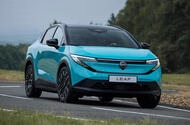How Will the New UK Electric Car Grant Impact Buyers and British Manufacturing?
If you’ve been eyeing an electric vehicle but hesitated because of the price, there’s some good news on the horizon. The UK government has rolled out a fresh Electric Car Grant (ECG), and it’s not just about helping drivers—it’s also a big win for British manufacturing. Let’s break down what this means for you, the car industry, and why the new Nissan Leaf is suddenly in the spotlight.
What’s Different About the New Electric Car Grant?
The ECG isn’t your typical blanket incentive. Instead, it’s targeted and science-driven. Only electric vehicles (EVs) priced at £37,000 or less qualify, and there’s a twist: the grant amount depends on how green the car’s manufacturing process is. If a model meets strict emissions standards—both from the carmaker and the country where it’s built—it can unlock the full £3,750 grant. If it falls a bit short, it still gets a £1,500 boost.
This approach is a shift from previous schemes, which mostly focused on the car’s tailpipe emissions. Now, the entire supply chain matters. The result? British-built EVs, especially those with locally made batteries, are in a prime position to benefit.
Why Is the Sunderland-Built Nissan Leaf Getting So Much Attention?
Here’s where things get interesting. The new Nissan Leaf, built in Sunderland with both its chassis and battery assembled on UK soil, checks all the right boxes. According to Nissan UK boss James Taylor, this puts the Leaf in a “very strong position” to secure the maximum grant. In fact, it’s likely to be one of the only models to do so.
Some industry insiders have raised eyebrows, wondering if the rules were crafted with Nissan in mind. Taylor pushes back on that idea, but he does admit the ECG echoes the French grant system, which also rewards low-emission manufacturing and has proven effective at boosting local industry.
How Does This Grant Support the UK Economy and Jobs?
It’s not just about selling more cars. By rewarding manufacturers who keep their supply chains local and green, the ECG is designed to strengthen the entire British automotive ecosystem. Taylor puts it simply: supporting “UK PLC” benefits the economy, businesses, and jobs. When Nissan’s Sunderland battery plant ramps up to full-scale production next year, British-built batteries will go into British-built cars—a virtuous cycle for local employment and expertise.
This isn’t just theory. According to the Society of Motor Manufacturers and Traders (SMMT), the UK automotive sector supports over 800,000 jobs and contributes billions to the economy each year. Incentives that keep manufacturing at home help safeguard these numbers, especially as the industry transitions to electric.
Will the Grant Actually Boost EV Adoption?
Early signs are promising. Taylor notes that interest in EVs has already “gone up four or five points in terms of share of interest” since the grant was announced. That’s a meaningful nudge in a market where, despite government mandates for zero-emission vehicles, consumer demand hasn’t always kept pace with supply.
The ECG is especially important for private motorists, who have sometimes felt left out of previous incentives that favored fleets or business buyers. By making EVs more affordable for everyday drivers, the grant could help bridge the gap between policy goals and real-world adoption.
How Does the UK’s Approach Compare to Other Countries?
The UK isn’t alone in using targeted incentives to shape the EV market. France, for instance, offers up to €7,000 (about £6,200) for EVs that meet strict emissions criteria, and Germany has similar programs. These schemes have proven effective at steering both consumers and manufacturers toward greener choices.
What sets the UK’s ECG apart is its explicit focus on rewarding local manufacturing. It’s a strategic move, especially as global competition for EV investment heats up. By tying incentives to domestic production, the UK is signaling that it wants to be a leader—not just a consumer—in the electric revolution.
What Should Buyers and Industry Watch for Next?
If you’re in the market for an EV, now’s the time to pay attention. Models like the Sunderland-built Nissan Leaf are poised to offer some of the best deals, thanks to the full ECG. But the grant’s focus on supply chain emissions means other manufacturers may need to rethink where and how they build their cars if they want to stay competitive.
For the industry, the ECG is both a carrot and a challenge. It rewards those who invest in clean, local manufacturing, but it also raises the bar for what counts as a “green” car. As battery plants and EV assembly lines spring up across the UK, expect to see more models vying for that top-tier grant.
The Takeaway: A Win for Drivers, Jobs, and the Planet
The new Electric Car Grant isn’t just about shaving a few thousand pounds off the price of an EV. It’s a carefully crafted policy that aims to accelerate the shift to electric, support British workers, and lower emissions across the board. For buyers, it means more affordable options. For the industry, it’s a call to innovate—and to invest in the UK’s future as a hub for green technology. And for the country as a whole, it’s a step toward a cleaner, more resilient economy.
So, if you’re considering making the switch to electric, keep an eye on those Sunderland-built models. The landscape is changing fast, and the best deals—and the biggest impact—might be closer to home than you think.

